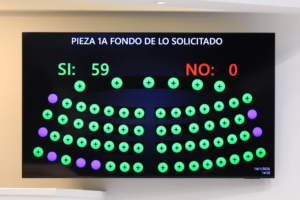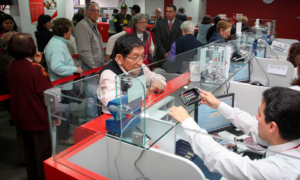
The Finance Committee ruled in favor of reforming the 2025 Budget Law to reinforce the budget allocations of various institutions in the Non-Financial Public Sector with resources totaling $359,930,000.
According to the proposal, during the execution of the 2025 fiscal year, several institutions have faced additional operating needs that were not included in the budget approved in december 2024, thus requiring additional funding to guarantee the fulfillment of their institutional objectives and goals.
The amount will be distributed among 15 entities, such as the Ministry of Education, Science and Technology, with US$116 million; Public Security and Justice, which would receive $48.5 million; another $37.47 million for the Ministry of National Defense, US$38.73 million for Health and US$16.1 million for the Interior Ministry.
Similarly, US$1,100,000 will be allocated to the Ministry of Labor, US$3,800,000 to the Ministry of Culture, and another US$20,000,000 to the Ministry of Agriculture and Livestock. Meanwhile, the Ministry of Public Works and Transportation will receive US$57,500,000 and the Ministry of Tourism US$4,130,000.
The allocations will also cover the needs of institutions such as the Tribunal Supremo Electoral with US$700,000, and the Ministry of Foreign Affairs with US$2,500,000. In addition, US$11,400,000 will be allocated to the Attorney General’s Office, US$1,300,000 to the Office of the Inspector General, and US$700,000 to the Office of the Human Rights Ombudsman.
To learn more about the proposal, the committee members met with Laura Arce, Deputy Director General of the Budget, who explained that the funds originate from tax surpluses recorded up to october 2025, thanks to the Anti-Evasion Plan, electronic invoicing, and increased economic activity. A total of US$209,930,000 will be incorporated from this surplus.
She also noted that the remaining amount, equivalent to US$150,000,000, comes from domestic borrowing through the issuance of securities in the national market under legislative authorizations granted in 2024 and 2025.
“It is important to clarify that, due to the implementation of programs and projects, these are needs that have arisen and were not included in the 2024 budget”, the official said.
Use of resources
The funds will be distributed across key sectors such as Education, Security, and Health. In the education sector, investments will be made in technology to improve learning related to the Growing Together Law. In Health, resources will focus on expanding the coverage and quality of medical services, with an emphasis on disease prevention.
In the case of National Defense, operational capacity will be strengthened in vulnerable areas, and the Territorial Control Plan will be supported, while the Security sector will allocate resources to strengthen public safety, the effectiveness of police forces, and cybersecurity.
In addition, a portion of the funds will be allocated to Public Works to continue advancing infrastructure projects to improve mobility and logistics.
The Fiscalía General de la República (FGR) and the Procuraduría General de la República (PGR) will receive funds to improve justice and the defense of human rights.
Finally, resources are allocated to Tourism and Foreign Affairs. The former will seek to position El Salvador as an international destination through the organization of events; The second will strengthen the country’s diplomatic presence and international cooperation, consolidating its global leadership.
You can also read:







